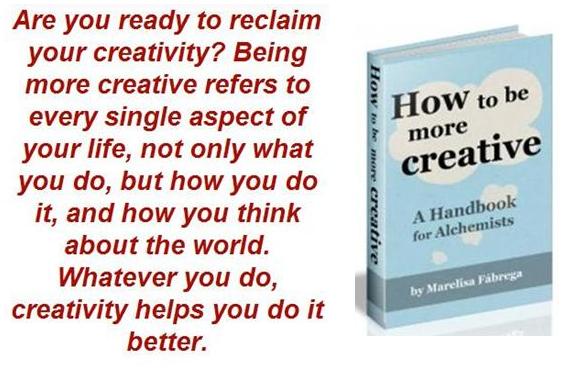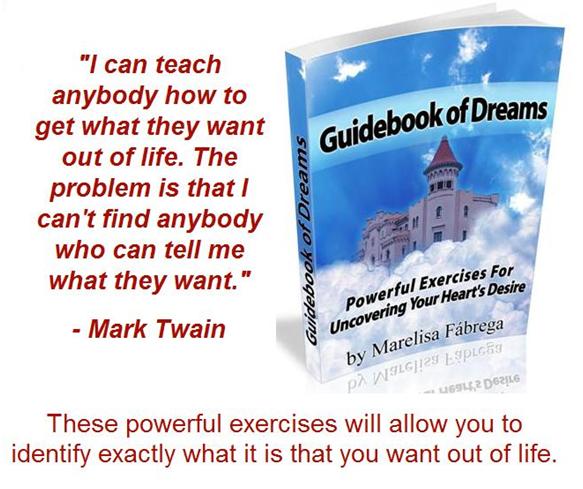
“Picture this: you with a big block of time; a serene, aesthetically pleasing hotel suite with free daily massages, a pool, and a delightful café; a privacy agreement signed by encouraging family members, friends and coworkers (though you may, of course, call them); breakfast in bed from room service with abundant choices from bacon and espresso to granola and green tea; pads of paper and a box of pens in your favorite colors; and an absolutely perfect laptop.”
– from “Write. 10 Days to Overcome Writer’s Block. Period.” by Karen E. Peterson, Ph.D
Since the above scenario is not very likely to take place for most people, here are nine creativity-sparking tips to help inspire you when the laundry needs to be done, you feel a cold coming on, and the cat just knocked over everything on your nightstand.
1. Isabel Allende is one of the world’s most famous writers; she’s written over a dozen books, starting with the acclaimed 1982 novel, “The House of the Spirits”. Several of her books–which are filled with magic realism, where the mystical merges with quotidian life–have been made into motion pictures. She had this to say about her writing process for “The House of Spirits” (Source):
“I was writing at night only because I had a day job; I worked in a school. And I had two shifts, from seven o’clock in the morning until one o’clock. And then from one o’clock until seven o’clock in the evening. So it was 12 hours, the day job. No lunch break. And I could write a book at night. So when my students sometimes say, “Oh, I don’t have time to write,” I say, Get up earlier. Stay up later. There’s always a way to do it if you want to. It’s like when you fall in love, there is always a way that you will get together, even if it’s behind a door.”
Stop telling yourself that you don’t have the time to write, paint, make music, and so on. Like Allende, find time to work on your craft whenever you can.
2. Follow Hugh MacLeod’s advice: hang a sign in a prominent place where you’ll be sure to see it every day that says “Create or die!”.
3. Karen E. Peterson, whom you’ll remember from the quote at the top of this blog post, suggests that you honor your creative work by giving it a home. Go to an office supply store and purchase a receptacle for your bursts of creativity: a plastic folder, an index card box, a shoe box to collect fabric samples, a container for storing your art supplies, and so on.
4. In “The Writer’s Book of Wisdom”, Steven Taylor Goldsberry explains that your creativity is tied to physical movement. He says the following:
“If you wait to be inspired before you start writing, if you wait to experience that bolt of soul-clarifying insight, you’re a fool and have no business being a writer. Write. The physical act itself will free the imagination. In this sense writing is like dancing, or sports, where the expression of grace comes only through movement.”
5. Jan Allsopp writes that when she can’t begin or progress on her creative work, it’s usually her inner perfectionist raising its ugly head. She explains that she has become too precious about her project: the idea in her head is so wonderful, that she couldn’t possible do it justice. So she procrastinates by going online to look at the work of others.
The way in which Allsopp overcomes procrastination is by making her idea less precious. She does this through volume. Here’s what she says:
“Instead of beginning the one perfect work, I begin 7. Or 52. Or 3 if I’m being a bit lazy. How can you be precious about 7 paintings!? Well, you can, but to a much lesser extent. I can even convince myself sometimes that it is OK to have, say 2 of those as just pure experimentation. As I progress on my array of works, some naturally slip into the ‘later’ basket and others I become obsessed with, working at them until they are done.”
6. Creativity expert Michael Michalko gave an interview in which he shares different creativity techniques. One of these is note-taking. Michalko explains that Walt Whitman would collect ideas to stimulate his creativity. Any time he had an idea, he would write it down on a slip of paper. He would then place these slips of paper into different envelopes, each one titled according to the subject matter.
Whenever he felt the need to spark a new idea, he would look through the relevant envelopes. Whitman would then retrieve several of these ideas and look for ways to weave them together, like a tapestry. These “idea tapestries” would often be the foundation for a new poem or essay.
7. Bruna Martinuzzi–founder of Clarion Enterprises Ltd.–wrote in a blog post for AMEX that if you don’t use your talents, they will become corroded. She adds that people often allow their talents to go unused because they worry about what others will think if they fail. Martinuzzi calls this need for approval from others a “mental prison”. She encourages people to ask themselves the following two questions:
- What have you left untried because of fears?
- What is the cost to you when you let your talents rust?
8. If your muse has gone AWOL, you may need creativity prompts to coax her back. In “The Writer’s Book of Matches”, the staff of the literary journal Fresh Boiled Peanuts offers thousands of creativity prompts to get your creative fires burning. Here are three of the prompts they offer:
“Upon reading the contents of his teenage stepdaughter’s diary, the man is left fearing for his life.”
“In the wee hours of every morning, a night watchman spends his time composing the symphony he’s always dreamed of.”
“During his third night out of town, a traveling salesman discovers a voodoo doll in his hotel room.”
Here’s a prompt from “The Writer’s Block” by Jason Rekulak:
“Trace the journey of a five dollar bill through the lives of five different owners.”
9. Mark McGuinness from the blog “Lateral Action” suggests that you stop trying to be original. He explains that ” . . . Your obvious is your talent. It may seem dull or unremarkable to you, but to others, with different life experience, it will seem fresh and surprising.” So instead of racking your brain trying to come up with something wild and whacky that has never been seen before, simply show up and be yourself, and trust that it will be enough.
Now, go do something creative.


Related Posts:
1. Need Fresh Ideas? Go Streetcombing
2. The Night Before Christmas and Stealing Like An Artist
3. Stuck For An Idea? Try SCAMPER
4. Ray Bradbury’s Best Writing Advice
5. 119 Journal Prompts For Your Journal Jar
Did you enjoy this article? Subscribe to “Daring to Live Fully” by RSS or by email, and get free updates.






 Marelisa Fabrega is a lawyer and entrepreneur. She holds a Bachelor of Science in Business Administration from Georgetown University in Washington, D.C., as well as a Juris Doctor from the Georgetown University Law Center. You can learn more about her
Marelisa Fabrega is a lawyer and entrepreneur. She holds a Bachelor of Science in Business Administration from Georgetown University in Washington, D.C., as well as a Juris Doctor from the Georgetown University Law Center. You can learn more about her 





